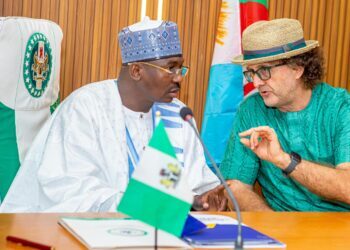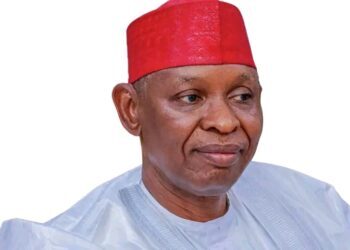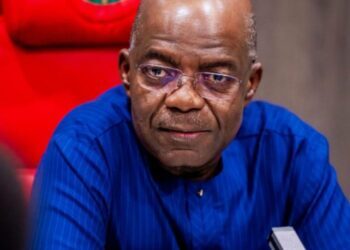By Jackson Udom
When the Nigerian Senate elected Godswill Obot Akpabio CON, as its Primus Inter Pares on June 13, 2023, not a few Nigerians expressed excitement at his emergence as President of the Senate and Chairman of the National Assembly of Nigeria.
The reason for that excitement was not far to seek. Many people knew that in Akpabio, the Senators had elected a ranking legislator with rich experience in governance, lawmaking and diplomacy.
For those who know, the job of the legislature transcends the popular functions such as lawmaking, vetting of budgets, confirming executive appointments and serving as a watchdog on the Executive and the Judiciary.
In fact, functional legislatures the world over, have been known to set the pace and hold the aces with regards to the socio-economic development of their countries because they explore the limitless opportunities presented by Legislative Diplomacy, which has to do with the process of creating and negotiating laws, regulations and policies at the international level, involving diplomatic efforts and cooperation among nations.
Legislative Diplomacy aims to harmonise legal frameworks, promote consistency, and address global challenges through collaborative lawmaking.
This all-important function of the legislature has come to assume such a great place in the life of Nation-States that lawmakers are seen as not only passive individuals making the laws to underpin developments but as active statesmen at the vanguard of making development happen.
Scholars all over the world have argued that individual members of the House and Senate have been known to frequently travel overseas on congressional delegations to confer with foreign leaders, investigate problems that arise, promote the interests of their countries and constituents, and even represent the president.
With the intentions of promoting global governance, enhancing economic cooperation, protecting human rights and the environment, combating transnational crimes and facilitating international trade and investments, among others, Legislative Diplomacy presents great imperatives for the socio-economic development of any Nation-State.
The recognition of these imperatives made millions of Nigerians to celebrate the emergence of Godswill Akpabio as President of the Senate, having known his pedigree as a technocrat, who ventured into public administration and demonstrated a passionate commitment to the development and socio-economic uplift of, first, Akwa Ibom State, where he was governor for eight years and later, Nigeria, which he has served in different capacities as Senate Minority Leader, Minister and now President of the Senate.
Indeed, Akpabio and Legislative Diplomacy seemed to have been made for each other. As the number one lawmaker in Nigeria, he has proven beyond a doubt that Legislative Diplomacy comes easy and can achieve greater mileage in the hands of individuals of his ilk, as his personality, carriage and candour have, no doubt helped the nation in achieving unprecedented results in terms of economic growth and rebuilding the trust reposed in Nigeria by countries and international organisations in just 12 months of his leadership of the National Assembly.
As it is known that Legislative Diplomacy requires effective communication, negotiation, and collaboration among governments, international organisations, and stakeholders to shape global legal frameworks and address shared challenges, Senator Akpabio’s adept skills, honed in his years as a corporate lawyer and his immense experience garnered in the corridor of power have been brought to bear, as he has succeeded in breaking barriers and making lasting impacts in attracting socio-economic developments to Nigeria through parliamentary diplomacy.
One of the obvious successes of the President of the 10th Senate in the area of Legislative Diplomacy was his attendance at the Inter-Parliamentary Union Assembly in Luanda, Angola, where he was elected into the Executive Committee of the IPU thus breaking a 59-year-old jinx. Nigeria was last elected into the Committee 59 years ago. He also participated at the IPU in Geneva, Switzerland, where he presented a paper asking the world to speak against the needless bloodletting in Gaza and save the innocent women and children from avoidable deaths.
Senator Akpabio has, also in the last one year as the Senate President, engaged in diplomatic courtesies with foreign missions in Nigeria, demanding collaborations with Nigeria on the economy, security and power and also seeking partnership with sister Parliaments across the globe for world peace and development.
As evidence of his credentials as a legislative diplomat, the IPU nominated the Senate President and 15 others as Preparatory Committee for the Sixth World Conference of Speakers of Parliament coming up in August 2025.
In line with the President Bola Ahmed Tinubu’s Renewed Hope Agenda, Akpabio’s Legislative Diplomacy has seen him court friends in different countries of the world, seeking partnerships and collaborations to improve security and peace in Nigeria, which without a doubt, is central to the socio-economic development and the progress of the country.
Through different fora and platforms, the Senate President has used the weapon of Legislative Diplomacy to the greatest advantage of Nigeria and Nigerians, seeking fresh opportunities and friendships for the country and building on the framework of renewed hope and vision of President Tinubu across different sectors.
For instance, it is on record that the Senate President met with the President of the Serbia Parliament, Ms Ana Brnabic in London, calling for Parliamentary Collaboration between the Nigerian Parliament and its Serbian counterpart and also extensively discussing issues of mutual interests between the two countries.
At another meeting with the members of the Saudi Arabia/Nigeria Parliamentary Friendship Group, led by Dr Abdullah Bin Hamad Al-Salamah, the President of the Senate called on the Government of Saudi Arabia to assist Nigeria in the fight against insurgency and trans-border terrorism, through sharing of intelligence.
On economic partnership, Akpabio rallied the Saudi Arabia delegation, saying: “Our relationship today has gone beyond pilgrimages and oil because Nigerians are now studying and working in Saudi Arabia in various spheres of human endeavours. The mutual economic ties and benefits are worth commending, especially in the aviation sector.
“In your search for economic partners, I want you to take Nigeria as a major partner. We solicit for more investments from you in the area of Oil, Gas and ICT. We would be happy for your collaboration with OPEC because if you assist OPEC, you are helping Nigeria and the black race to secure and prevent influx of immigrants.”
Akpabio had also, at another diplomatic engagement, urged the German Government to collaborate with Nigeria in the areas of economy, security and power in order to enhance the socio-political development of Nigeria.
He made this call when he received the German Ambassador to Nigeria, Annette Gunther. He told his august visitor that Nigeria was looking for partnership and guidance from Germany in the area of security and power generation and that the country would want to improve on the existing relationship between it and Germany,
“The Nigerian Parliament would be very glad to join the President Bola Tinubu-led administration to improve on that relationship. Anything we need to do in terms of legalising or in terms of legislation to make most of the policies and programmes that you are embarking on with the government possible, would be done. We want more German companies to join those that are already here,” Akpabio said.
Today, as a testament to the cordial relationship between the executive and the legislature as well as the combination of President Tinubu’s savvy in foreign relations and Akpabio’s Legislative Diplomacy, the Nigerian economy has received a huge boost, with international agencies and countries reposing a greater trust and confidence in Nigeria’s ability to beat its challenges.
On the African sub-regional and international scenes, President Tinubu’s Renewed Hope Agenda as it relates to Nigeria’s foreign policy and relations have received a major boost, as Akpabio’s Legislative Diplomacy has not only helped the country to speak with one united voice that Nigeria is resolute in its bid to reclaim its pride of place as an emerging world power and a big brother in Africa, who would do everything to entrench peace and democracy in West Africa.
In a similar vein, Senator Akpabio also⁰ aligned his diplomacy with President Tinubu in seeking world peace, knowing well that it is only when there is peace in the world that Nigeria will be able achieve its socio-economic aspirations.
A case in point was when he lent his voice to the call for the restoration of lasting peace to war-torn Gaza, making passionate appeals for nations to rise above sentiments and invoke the spirit of humanity, by doing all it requires to bring sustainable peace to the region.
In his passionate commitment to growing the country’s economy in tandem with the vision of the President, the Akpabio-led National Assembly did not limit its focus to relationships with countries’ parliaments and Heads of Government but also international organisations, daily preaching the message of Nigeria’s socio-economic emancipation.
One of such organisations canvassed by the Senate President was the World Trade Organisation, where Nigeria’s delegation to the 148th Assembly of the Inter-Parliamentary Union (IPU), led by him, sought the collaboration of the World Trade Organisation (WTO) in the area of Digital and Marine economies.
According to him, “we used our attendance at the IPU to pay a courtesy visit to one of Nigeria’s very costly exports to the world, Dr Ngozi Okonjo Iweala; the Director General of the WTO. We came to thank her for the job she is doing for the world and thank her staff for supporting and standing by her to succeed. We, in Nigeria, are very proud of her.
“We had discussions on the various developmental programmes of the WTO and we noticed that there were spaces where Nigerians can become major players. We discussed issues affecting trade back home in Nigeria and ways in which the National Assembly can assist in removing barriers, through legislation for the benefit of our people.
“We also talked about the issue of regulations concerning Digital economic contents, illegal fishing along the coastal states of Cross River, Rivers, Akwa Ibom and Bayelsa states. How Nigerian women could benefit from the recent program funded by the organisation was also discussed. The establishment of a Digital trade portal, wherein all trade information could be accessed by our people topped our discussion with the WTO.
“The deliberations were fruitful and we are confident that with our support in all of these, Nigerians would be the better for it.”
Speaking on what could be the direct gains of Legislative Diplomacy, Senator Akpabio once described his election into the Executive Committee of the Inter-Parliamentary Union as an enormous opportunity for Nigeria, saying his election would impact positively on the country through the creation of employment and developmental opportunities for young Nigerians, who are seeking to become diplomats.
“This will also attract foreign direct investments in the area of training and retraining and capacity building, not just for the legislature but for people who are in different fields. The benefits are enormous,” he added.
The Senate President had also indicated that his election was a major political victory for Nigeria, which has missed out at the decision-making table of the union for 59 years, stressing that the victory was symptomatic of the Renewed Hope Agenda of the President, as it was wont to bring great hopes and opportunities to the country.
As espoused by advocates of Legislative Diplomacy, a legislator is more than a lawmaker; he is to be, for his country, a negotiator and a marketer, attracting global attention and navigating different issues to bring economic opportunities to his country. This much and more has been done by Akpabio in his less-than-one year of leadership and the expectations abound, as Nigerians begin to see the practical manifestations of his diplomacy in the months and years to come.
Udom is Special Assistant On Media (Print) To The President of the Senate











